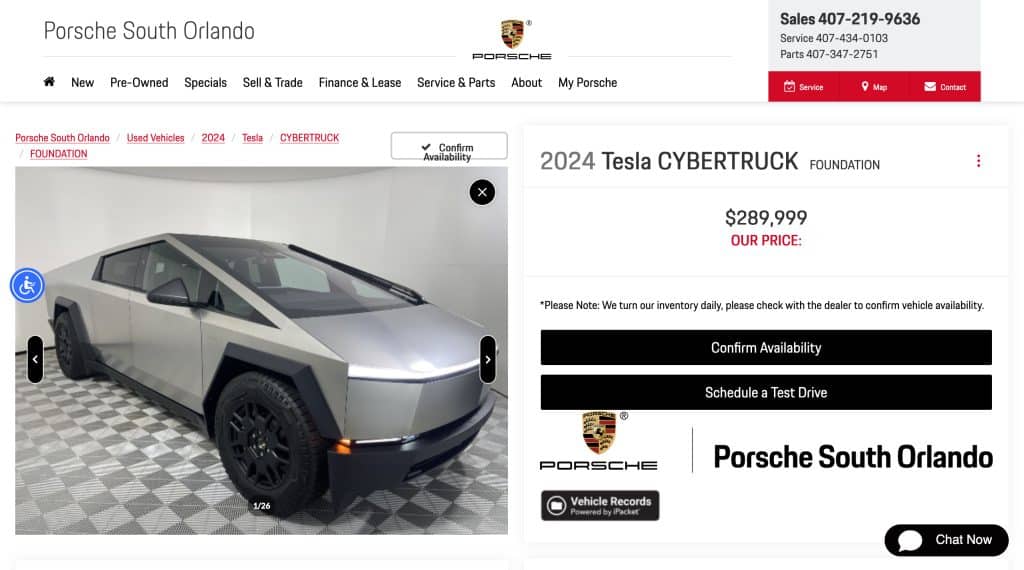- 💰 The Tesla Cybertruck, previously sold at auction for $244,000, is now listed for sale again at a Florida dealership for $289,999.
- 🛒 Despite Tesla’s no-resale policy, Porsche South Orlando purchased the Cybertruck at auction and is now reselling it.
- 🚗 The Cybertruck for sale is a dual-motor, all-wheel-drive edition, which is in limited quantity as Tesla ramps up production.
- 📝 Tesla’s original seller agreement stipulates a penalty of $50,000 or the value received for selling the vehicle within the first year of delivery.
- 🚫 It’s unclear how Tesla will enforce the no-resale policy, but the company retains the right to refuse to sell vehicles to violators in the future.
- 🏭 Tesla produces the Cybertruck at its Gigafactory in Austin, Texas, and aims to ramp up production over the next 12 to 18 months.
In the realm of automotive news, few stories have captured the attention of enthusiasts and industry insiders quite like the resale saga of the Tesla Cybertruck. From its initial auction sale to its reappearance at a Florida dealership, the journey of this iconic electric vehicle has been nothing short of captivating. In this blog post, we’ll delve into the details of the Cybertruck resale controversy, examine the implications for Tesla and its customers, and discuss the broader implications for the automotive industry as a whole.

The Resale Revelation
The Cybertruck resale saga began when a dual-motor, all-wheel-drive edition of the vehicle was sold at auction for a staggering $244,000. Despite Tesla’s explicit no-resale policy, the vehicle has now resurfaced at a Florida dealership, listed for sale at a hefty price tag of $289,999. This turn of events has raised eyebrows and sparked a debate within the automotive community about the enforceability of manufacturer resale policies and the ethics of vehicle flipping.
The No-Resale Policy Conundrum
At the heart of the Cybertruck resale controversy lies Tesla’s stringent no-resale policy, which prohibits buyers from selling their vehicles within the first year of delivery. Violators of this policy may face penalties of up to $50,000 or the value received for selling the vehicle. However, as demonstrated by the recent resale of the Cybertruck, enforcing such policies in practice poses significant challenges for manufacturers like Tesla.
Tesla’s Enforcement Dilemma
While Tesla retains the legal right to refuse to sell vehicles to violators of its no-resale policy, the practicality of enforcing such measures remains questionable. As the Cybertruck resale saga illustrates, once a vehicle changes hands, tracking and enforcing resale restrictions become increasingly complex. Moreover, the potential reputational damage and legal implications of penalizing customers for resale activities must be carefully weighed against the benefits of upholding company policies.

Production Constraints and Market Dynamics
Beyond the controversy surrounding resale policies, the Cybertruck saga sheds light on broader issues within the automotive industry, particularly regarding production constraints and market dynamics. As Tesla strives to ramp up production of the Cybertruck at its Gigafactory in Austin, Texas, limited availability and high demand have created a fertile environment for resale speculation and opportunistic pricing strategies.
The Future of Vehicle Resale Policies
The Cybertruck resale saga serves as a microcosm of the evolving landscape of vehicle resale policies and consumer rights in the digital age. As automotive manufacturers grapple with the complexities of enforcing resale restrictions and protecting brand integrity, balancing the interests of customers, dealerships, and shareholders will be paramount. Moving forward, transparent communication, clear contractual agreements, and proactive engagement with customers will be essential for navigating the delicate balance between enforcing company policies and respecting consumer autonomy.
Conclusion: Navigating Ethical and Legal Boundaries
In conclusion, the Tesla Cybertruck resale saga offers valuable insights into the intricate interplay between business ethics, legal frameworks, and consumer behavior in the automotive industry. While the controversy surrounding resale policies may persist, it also presents an opportunity for reflection and dialogue on how best to reconcile competing interests and uphold industry standards. As Tesla and other manufacturers continue to innovate and adapt to changing market dynamics, finding common ground between regulatory compliance, customer satisfaction, and corporate responsibility will be key to fostering a sustainable and ethical ecosystem for vehicle ownership and resale.





